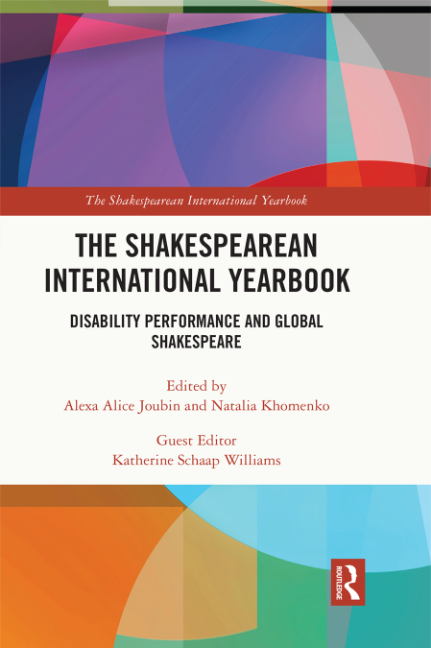Shakespearean International Yearbook: Disability Performance and Global Shakespeare
General Editor: Alexa Alice Joubin; Co-editor: Natalia Khomenko; Guest Editor: Katherine Schaap Williams. Routledge, 2024 ::: ISBN 9781032649238 ::: DOI 10.4324/9781032649238
Table of Contents
Preface by Alexa Alice Joubin and Natalia Khomenko
Part I: Disability Performance and Global Shakespeare
1. Introduction: Disability Performance and Global Shakespeare
Katherine Schaap Williams
2. Concealing, Simulating, or Re-Defining Disability?: Richard III and Performing (with) Disability in Arabian Gulf Theatre
Katherine Hennessey
3. “A body like this can’t play Richard”: Embodied Representation and Welshness in richard iii redux [or] Sara Beer is/not Richard III
S.R. May
4. “Baroque Staring”: Caliban in Polish Theater
Anna Kowalcze-Pawlik
5. Making Meaning of the (Ab)normal Body: Reading Caesar’s Body as a Palimpsest in Julius Caesar and Sri Lankan Performance
Isuru Ayeshmantha Rathnayake
6. “What’s with Him?”: Reading Hamlet and Haider through the Lens of Disability-Craft
Deyasini Dasgupta
7. Intellectual Disability, Madness, and Gender in Karim-Masihi’s Tardid/Doubt: A Rewriting of Shakespeare’s Hamlet
Shekufeh Owlia
8. “Cast[e]ing Shakespeare”: Intersections of Disability and Race in Vishal Bhardwaj’s Maqbool
Zainab Cheema
9. Against White Cripistemology: Seeing Race and Global Disability in King Lear
Penelope Geng
Part II: The Year in Review
10. Access and Global Shakespeares: The State of the Field
Roderick Hugh McKeown
The fields of critical disability studies and global Shakespeare have a great deal to say to each other, which is why we are creating this opportunity for an interdisciplinary dialogue and reflection.
This year’s Shakespearean International Yearbook focuses on the theme of global disability performances of Shakespeare. Curated by Katherine Schaap Williams, this cluster of articles attends to the global turn in critical disability studies by expanding the history of Shakespearean performance in India, Iran, Sri Lanka, Poland, Russia, and the Arabian Peninsula.
Thinking beyond the Western framework enables a more inclusive, and expansive, perspective on the diverse ways in which disability aesthetics affect disability politics and on the question of what “counts” as disability representation. When they transcend the “nation,” critical tools from disability studies are more effective in aiding our deconstruction of ableist erasure of human variation.
Studies of global performance can further enrich our understanding of disability representation by mobilizing a range of local histories and theatrical traditions. Ultimately, examining disability performances in relation to glocal definitions of alterity fosters culturally and politically nuanced visions of deploying Shakespeare in service of social justice.
